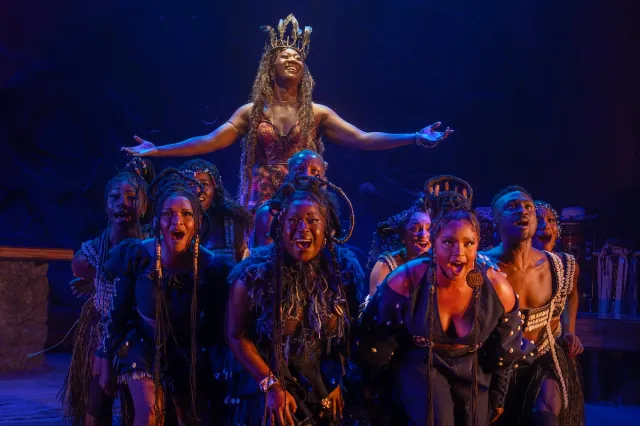Saheem Ali, Michael Thurber, and James Ijames’s musical opens off-Broadway after a long gestation.
Zachary Stewart
May 20, 2025
There is a tendency to view change and tradition as diametrically opposed, as if embracing one necessarily means rejecting the other. But Goddess, an earnest, vibrant, and flawed new musical at the Public Theater, makes a convincing argument that change and tradition are part of the same ancient cycle. More specifically, the show by Michael Thurber (score), Saheem Ali (book and direction), and James Ijames (additional book) suggests that disobedience is baked into the folklore of East Africa and that love is the most beautiful act of rebellion.
At the center of the story is Nadira (Amber Iman), a singer at the Mombasa jazz club Moto Moto. Omari (Austin Scott), the scion of the powerful and devoutly Muslim Tehmu political dynasty, instantly falls for her—and why wouldn’t he? She’s actually Marimba, the goddess of music, in disguise. Like Omari, she is also bucking the expectations of her mother, Watamaraka, the Goddess of Evil (breathtaking puppet design by Julian Crouch).
A sax player recently returned from studying abroad in New York City, Omari is drawn to the youthful cosmopolitan energy of Moto Moto. But his father (J Paul Nicholas), the governor of Mombasa, would prefer his son avoid such a seedy nightspot, especially as Omari mounts his own long-anticipated campaign to replace dad in office. His fiancée, Cheche (Destinee Rea), is more than ready to be first lady—but is Omari ready to give up the music and Marimba?
Casual fans of musical theater will easily recognize the tropes: the royal child who wants more, the nightclub where disparate groups get down together, the trio of big-voiced divas who narrate this tale of filial impiety (Melessie Clark, Teshomech Olenja, and Awa Sal Secka, all conjuring musical-theater magic). Daddy chill, we just want to dance. Even if you’re completely unfamiliar with Kenyan mythology, you’ll know exactly where Goddess is going, making it feel simultaneously comforting and a bit dull.
I wondered if this was the bland flavor of an overprocessed musical. Ali, who is originally from Kenya and is associate artistic director of the Public, has been shepherding Goddess as a passion project since 2007. The world premiere played Berkeley Repertory Theatre in 2022, but it has certainly changed since then. Two months ago, original book writer Jocelyn Bioh departed the creative team, explaining, “It has evolved to a different place.” One can still sense the cut-and-paste scars on the script, especially in the second act when the threads of politics, marriage, and mythology are tied up faster than a calf at a rodeo.
Thurber’s score pulses with a pan-African beat that immediately pulls us in with the opening number “Mombasa, Mombasa.” Darrell Grand Moultrie’s sweaty, sexy choreography lets us know this is the best party in town, even if the lyrics feel a bit forced in their declamation. “A Muslim and a Christian, / Grinding to the Beat!?! / Let me tell you friends, / That won’t happen in the streets,” reads like a throwaway line from Oscar Eustis’s program note, although the cast delivers it with nothing less than full conviction.
Goddess benefits from strong supporting performances: Nick Rashad Burroughs and Arica Jackson are charming and hilarious as Moto Moto employees Ahmed and Rashida, Kenya’s answer to Beatrice and Benedick. Ayana George Jackson brings much-needed emotional heft to the role of Omari’s mother, Siti, especially in the second act number “Baobab Roots.” And Reggie D. White exudes sultry witchiness as the seer Balozi.
Scott does a fine job as Omari, injecting the wayward son’s story with a bit of angst even though it’s obvious what choice he will eventually make. It’s the same choice the audience makes from the moment Iman steps onstage.
Iman is the center of gravity around which this musical spins. I’ve watched her onstage since Soul Doctor, and her voice only seems to grow more expressive with each role she plays. Melancholy and hope intertwine in her voice like lovers, lending a richness and complexity to every number that might not otherwise be present. Unquestionably, she is the goddess of music.
Scenic designer Arnulfo Maldonado has created an arresting grotto for her to inhabit, stunningly lit by Bradley King. I wondered if Ali could have used the permanent backdrop of the club as the springboard for a more site-specific staging that never really leaves Moto Moto (in this version, cast members must frantically assemble and strike a small living room set every time there is a Tehmu family meeting).
Dede Ayite’s colorful costumes flatter the sculpted-by-the-gods bodies in this cast, although they strangely never change even as the days tick by (adding insult to the injury of having her engagement broken off, Cheche is forced to wear a hideous orange-and-black pantsuit for the entire show). Nevin Steinberg’s sounds design is crisp, allowing us to hear every good-enough lyric. And Nikiya Mathis’s wigs are all little masterpieces.
It’s impossible to have a bad time at Goddess. Like a so-so night out at the club, you’ll have fun, but you probably won’t remember much about it a year from now.
Get the best deals and latest updates on theater and shows by signing up for TheaterMania's newsletter today!
Ashman died in 1991, but his legacy lives on through Aladdin, Beauty and the Beast, Little Shop of Horrors, The Little Mermaid, and more.
Get the best deals and latest updates on theater and shows by signing up for TheaterMania's newsletter today!
By providing information about entertainment and cultural events on this site, TheaterMania.com shall not be deemed to endorse, recommend, approve and/or guarantee such events, or any facts, views, advice and/or information contained therein.
©1999-2025 TheaterMania.com, Inc. All Rights Reserved. Privacy Policy & Terms of Use
